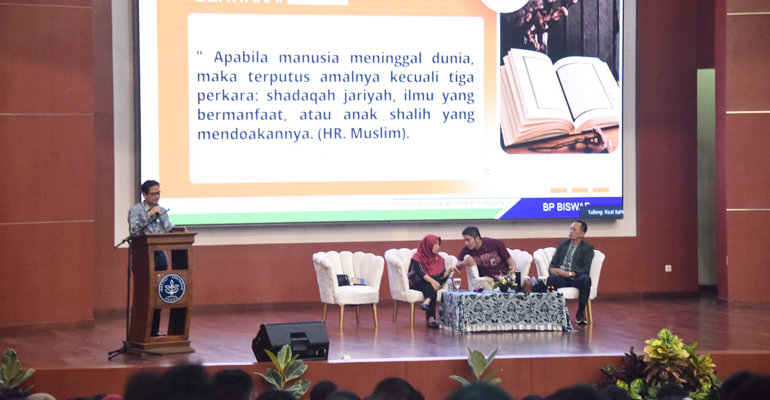Productive Waqaf Education at the National Seminar, IPB University Lecturer Invites Students to Start Waqf

Vice Chairman of the Business Development, Investment and Waqf Agency (BP Biswaf) IPB University, Dr Alla Asmara provided education about waqf in a national seminar entitled ‘Menghadapi Ketidakpastian Global melalui Optimalisasi Pembangunan Ekonomi Syariah Berkelanjutan’ (26/8). He also invited IPB University students to start waqf.
“The urgency of waqf is not only religious, but also how waqf is beneficial from the socio-economic dimension. “Waqf, which is a form of worship, is highly recommended to have the dimensions of hablum minallah and hablum minannas,” he said in a national seminar held at the Auditorium of the Faculty of Economics and Management (FEM) IPB University.
One type of waqf property is productive waqf. Dr Alla explained, productive waqf is a waqf management scheme in a productive manner so that it is able to produce a sustainable surplus. This waqf surplus will become a source of perpetual funds to finance community needs, including education, health services, research and other needs of the community.
Some examples of productive waqf programs include educational waqf, restaurant waqf, micro, small and medium enterprise (MSME) center waqf, livestock waqf and hospital waqf. At IPB University, there are several productive waqf programs that are already running, namely waqf providing water stations and scholarships. Every waqf program developed by Nazir IPB University is always plotted with the Sustainable Development Goals (SDGs) to be achieved.
“Productive waqf plays a role in the redistribution of assets and benefits. “The benefits have also shifted from private benefits to social benefits, from benefits enjoyed by individuals to benefits enjoyed by the wider community,” said the IPB University lecturer from the FEM Department of Economics.
Considering its very important role and many benefits for the people, there are six things that according to Dr Alla can make productive waqf more optimal. These six things are waqf literacy and education, competent institutional and human resources, professional management, productive waqf scheme innovation, development of a productive waqf ecosystem and regulatory support
“Waqf on the one hand is something that has a dimension of eternity. Waqf means legacy. So, if younger students want to create a lasting legacy, then that is waqf. It’s easy for waqf to become a lifestyle. “If possible, give waqf every day or at least once a week, or once a month, or even once in your life,” said Dr Alla while inviting IPB University students to give waqf.
According to Law Number 41 of 2004, waqf is the legal act of a wakif to separate and/or hand over part of his property to be used forever or for a certain period of time in accordance with the interests of worship or general welfare according to sharia.
The purpose of waqf is to utilize waqf property according to its function. The function of waqf assets is to realize the potential and economic benefits of waqf objects for the purposes of worship and advancing public welfare. (MHT/Rz) (IAAS/SHY)



